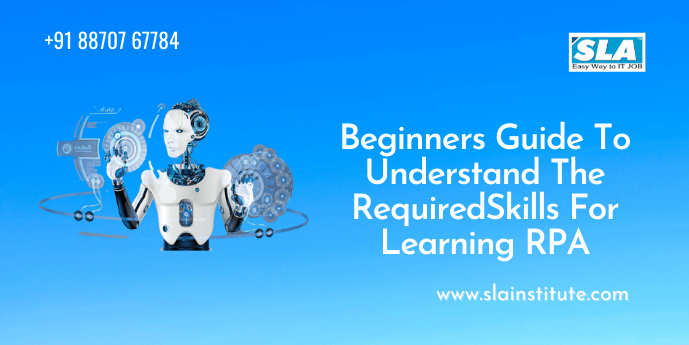Introduction
RPA (Robotic Process Automation) is an automated rule-based business processes to do efficient execution of deploying robots with cost-effective development. RPA reduces the human involvement in the process of automating workflow with the help of robots or software applications. There are three main terms you as a beginner need to understand: Robotic, Process, and Automation.
Robotic : Entities that are mimic human actions.
Process : Systematic process steps for executing a meaningful activity.
Automation : Automatic action that is done by a robot without any human intervention.
These three terms together make mimicking the human actions by performing the sequence of steps and brings an effective activity without human interaction is known as Robotic Process Automation.RPA requires some basic skills for learning it with capable of understanding the business requirements and convert them into Automated Process using some RPA tools like Blue Prism, UiPath, Automated Anywhere, and so on.
Thankfully, learning RPA need not any in-depth knowledge on coding, because all the RPA tools have kind of unique mechanism to learn it quickly and deeply. However, you need to develop your logical and analytical skills and strong future is guaranteed for the one who is practicing on it.
Here, the list of skills given below which are required for learning RPA and we are sure it will help you to equip for the better software development and outshine your skills in developing RPA applications.
- Basic Knowledge in VB and .Net framework as most of the RPA tools are developed in it.
- Understanding of VBA Macros, Excel, and its implementation
- Fundamental of writing and integrating Python scripts with RPA toolset
- Basic understanding about building components like Auto-ML, NLP, and AI integrations such as Microsoft Luis or IBM Watson
- Basics of document capture technologies such as ABBYY
- Fundamentals of Business Process Modelling or UML (Unified Modelling Language)
- Knowledge on Business Exceptions Handling
- Understanding of Data Parsing with the use of XML, JSON
- Practice with APIs in workflow development
Other than these technical skills, there are some more logical skills required to enhance in the following fields :
- Systematic thinking
- High level programming mindset
- Active learning with update awareness
- Basic mathematical concepts
- Science and applied mathematics knowledge
- Good judgmental and decision-making ability
- Expert level in communication to deliver your ideas
- Ability to solve complex problems in an easy way
- Basic knowledge about technology design
- Persistence in the field in any kind of situation
These basic skills will help you to learn RPA technology effectively and apply them in real time on the project development at the time of learning itself. Investing your time on developing the above said skills bring more opportunities on RPA development projects with more productivity and result-oriented outputs to the enterprises.
We can understand the requirement of RPA developers through the wide range of applications that are found in the market. Many reputed companies like Amazon, Google, and Facebook are continually in the making of RPA projects to meet the global needs of automating process like data analytics, transactions, and some other functions.
RPA Developers generally have three basic roles such as Process Designer, Automation Architect, and Production Manager. Some of the required skills for RPA developers are listed below for the on-demand roles of top companies:
Role : Process Designer
Requires Skills :
- Strong Analytical and Problem-Solving skills
- Basic experience in one or more RPA tools (Blue Prism, UI Path, and Automation Anywhere)
- Minimum one year of experience in coding or scripting in any programming languages, SQL databases, and application development
- Practice in Process Analysis, Design, and Implementation even as internship level
- Ability to prioritize and handle multiple portfolios
- Basic knowledge in Lean Six Sigma process methodologies
Role : Automation Architect
Required Skills :
- Better to have certifications in any of the field such as ITIL, TOGAF, CoBIT, PMP, Lean Six Sigma, and Prince2
- Ability to narrate technical specification documentation for required RPA projects
- Ability to develop complete technical architecture for any kind of RPA projects with extensible and scalable features
- Adequate hands-on experience in any of the following RPA tools such as Automation Anywhere, Blue Prism, UiPath, Open Span, Redwood, and WorkFusion, etc.
- Strong knowledge in any of the programming languages like C/C++, Python, VB Script, Java, Ruby, JavaScript, and .Net
- Basic knowledge in handling tools like NICE, Nuance, Enterprise Systems SAP, OCR Tools, Oracle, Custom Apps, PeopleSoft, ITSM Tools Service Now, Jira, BMC Remedy, etc.
- Fundamentals of Automation platforms, frameworks, and tools, etc.
Role : Production Manager
Required Skills :
- Minimum 2 to 3 years of experience in RPA Project development and implementations
- Strong knowledge in Architecture and Delivery experience
- More hands-on experience with real time projects using RPA tools
- Well-built knowledge in innovativeness and ability to integrate creative technologies
- Minimum 5 years of technical experience in IT industry
- Minimum 0-3 years of experience in Robotic Process Automation using any RPA tools and in-depth knowledge in it
- Aware of related RPA technologies and its version up to date
End Note :
Learning RPA and its tools will be complicated without developing the required skills for producing the unique software application development in the market. Because many companies are involved today in the process of developing the efficient RPA applications and they required developers with strong skills on the mentioned field along with the certification. Get valuable certification course in the best RPA Training Institute in Chennai at SLA Institute to acquire and equip the adequate skills to perform from day one in reputed companies.

